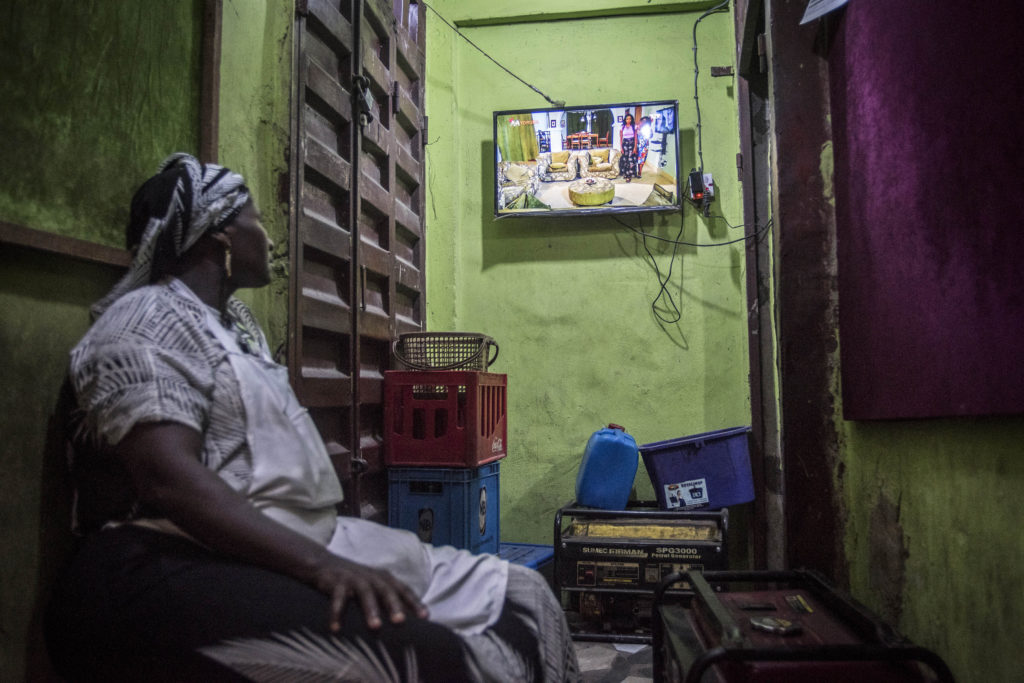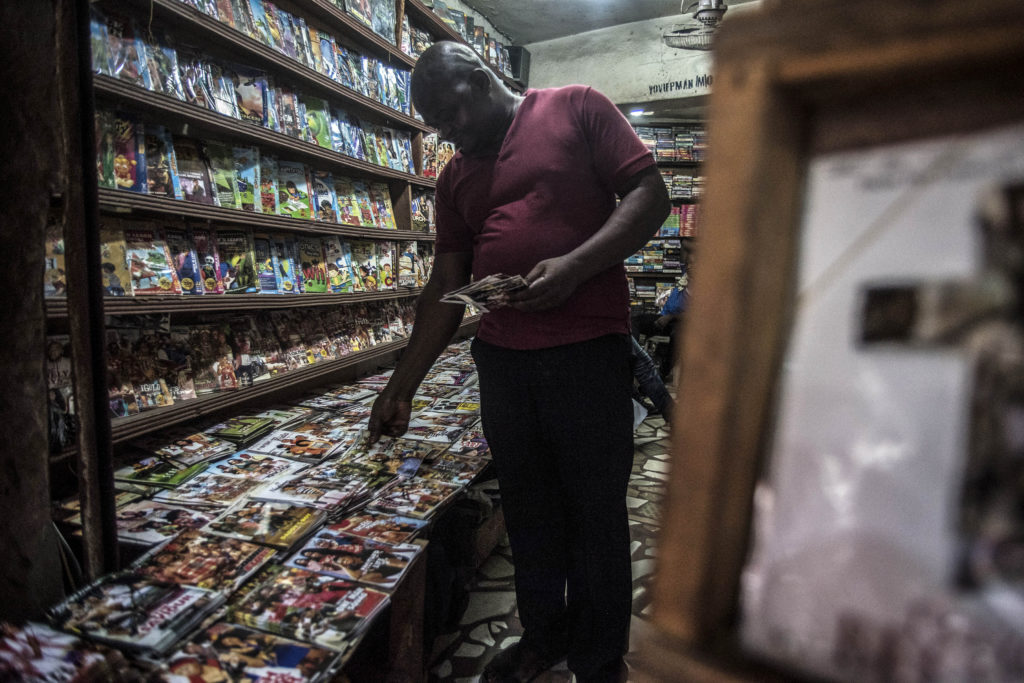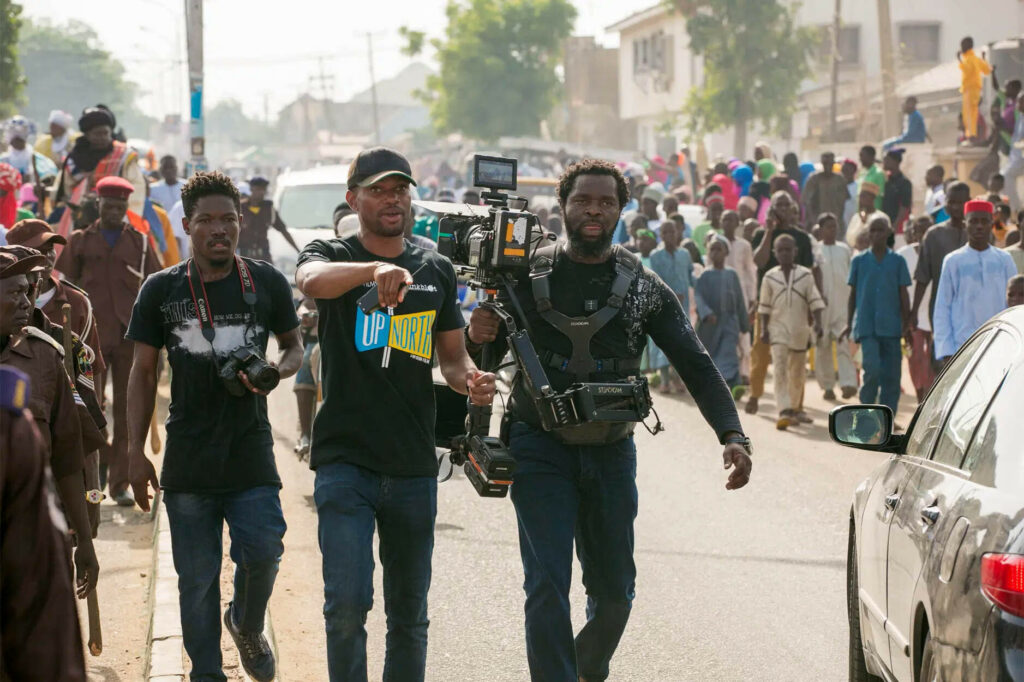More recent film projects have had to pause or rethink production in the wake of Covid-19. (Graphic: John McCann/M&G)
Before the coronavirus pandemic, director Adebola Ogunshina had the perfect script for his romance movie, filled with emotional highs and lows and intimate love scenes.
Then the pandemic struck.
Adebola — a seasoned, Ibadan-based director and scriptwriter — found that Covid-19 has, in every sense, delivered the kiss of death to that script. He now finds himself in the unenviable position of having to rewrite it to incorporate “creative social distancing” into those love scenes.
“We have to keep pushing, because it is a love story, but we cannot bring two lovers together at this time,” Ogunshina told the Mail & Guardian. “We ought to have started in May but now we are looking at July to start shooting.”
 A woman watches a Nigerian film on a television at her shop in Idumota market in Lagos on February 19, 2019. – With its turncoats, crimes, cash and even the occasional touch of black magic, the theatrical twists and turns of Nigeria’s colourful politics are inspiring directors from the country’s Nollywood movie industry. (CRISTINA ALDEHUELA / AFP)
A woman watches a Nigerian film on a television at her shop in Idumota market in Lagos on February 19, 2019. – With its turncoats, crimes, cash and even the occasional touch of black magic, the theatrical twists and turns of Nigeria’s colourful politics are inspiring directors from the country’s Nollywood movie industry. (CRISTINA ALDEHUELA / AFP)
The simple act of two lovers pressing lips together now feels out of sync in a post-lockdown world.
“I cannot bring people together on set for a movie where they have to kiss,” Ogunshina says. “It doesn’t make any sense. So I have started reworking the script and thinking of another angle.”
For weeks now, filmmakers in Nigeria have been figuring out how they can proceed with projects they had to postpone because of Covid-19.
The fallout for the Nigerian film industry has been significant. Many of the million-odd people who earn a living from Nollywood are suffering financially, while coronavirus containment measures are making it more difficult to make movies.
Nollywood has already lost about 3-billion naira (about $8.33-million) since mid-February thanks to the pandemic, according to Moses Babatope, the chief operating officer of Filmhouse Cinema.
The film-production process is broad, requiring a number of different groups — actors, sound producers, cinematographers, hair and make-up artists, set decorators, costume designers, camera operators and sound producers — to work together seamlessly.
Although filming as such was not prohibited by the emergency restrictions imposed on some parts of the country, it was practically impossible to shoot anything while following safety guidelines.
Ogunshina said that the inability to shoot films means more people in the industry “are going broke”.
“The industry is like a village — when you give a rule that you cannot be more than 20 people in one place, people will rather not shoot. And if they don’t shoot, they will not make money,” he said.
Although the government has now eased most restrictions, the reality of the pandemic continues to complicate filming. But slowly, producers and directors are adapting to the new normal.
Producers are having to work with fewer crew members on set, to allow for physical distancing. Face masks and sanitisers must be provided for crew members and cast. Additionally, everyone on set is required to sanitise their hands every 30 minutes during the shoot. These additional measures are making production costs much more expensive.
But they are considered absolutely necessary. After all, a single Covid-19 infection on set could totally derail the production — and perhaps even the production company itself.
Ogunshina said productions now struggle to get eight scenes completed in a day, compared with at least 18 scenes before the pandemic. In Ibadan, in Oyo State, there is still an 8pm to 5am curfew in place — which means there can be no night scenes in the Yoruba telenovela, Borokini, he is shooting there.
 A customer looks at some Nollywood movies in a shop at Idumota market in Lagos on February 19, 2019. – With its turncoats, crimes, cash and even the occasional touch of black magic, the theatrical twists and turns of Nigeria’s colourful politics are inspiring directors from the country’s Nollywood movie industry. (CRISTINA ALDEHUELA / AFP)
A customer looks at some Nollywood movies in a shop at Idumota market in Lagos on February 19, 2019. – With its turncoats, crimes, cash and even the occasional touch of black magic, the theatrical twists and turns of Nigeria’s colourful politics are inspiring directors from the country’s Nollywood movie industry. (CRISTINA ALDEHUELA / AFP)
Adeleye Fabusoro, another Nigerian filmmaker, said the coronavirus has caused a very big “loss in terms of money, in terms of time value and also in the economy of the industry”.
Fabusoro has “drastically” reduced the crew members for his soap opera, from 25 to 10. The reduction in crew is designed to help film producers to navigate the current financial troubles of the industry. He added that close-up shots are now being prioritised over wide and medium shots, to limit the interactions of actors on set.
This makes everything slower. “Projects that we expect to have finished in the first quarter of the year are still lingering,” Fabusoro said.
Imoh Umoren, a Nigerian director and producer, was in the middle of filming a new series, Channel 77, when lockdown forced a halt to production. Another film, currently in pre-production, will go ahead — but with strict precautions in place.
“We are going to test everybody before we go on location and everyone will be housed together to reduce the risk of coming to work from different places,” Umoren said.
For films that are able to be completed, another challenge awaits: the loss of revenue thanks to the widespread closure of cinemas. In 2019, Nigerians spent 6.7-billion naira ($17.3-million) on cinema tickets.
 The show must go on: On the set of the Nollywood film, Up North, which was released in 2018. More recent film projects have had to pause or rethink production in the wake of Covid-19. (Anakle Films)
The show must go on: On the set of the Nollywood film, Up North, which was released in 2018. More recent film projects have had to pause or rethink production in the wake of Covid-19. (Anakle Films)
“Because cinema is the first window for us, we have to go through that window, otherwise we will lose a significant point of revenue we had projected,” said Ekene Mekwunye, a filmmaker whose latest film is still awaiting release. “We are confused as we speak right now because even if cinemas open next month, which movies are going to cinema? I don’t even know, because we have a backlog of three months.”